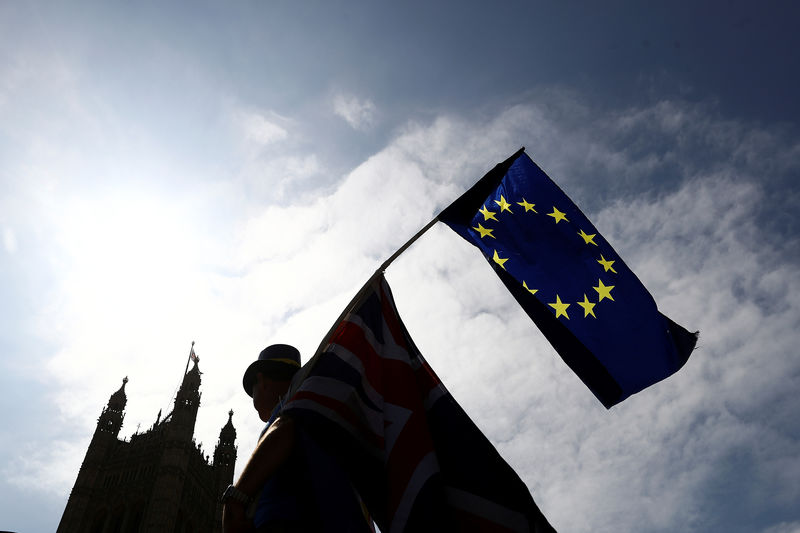By Jonathan Cable
LONDON (Reuters) - The chances Britain will leave the European Union in March without a deal are one in four, a Reuters poll found, and the Bank of England is likely to wait until after Brexit before raising borrowing costs again.
The Reuters poll was conducted Aug. 29-Sept. 3, as pressure mounted on British Prime Minister Theresa May, who is struggling to sell what she calls her business-friendly Brexit to her own party and across a divided country.
With less than two months before Britain and the EU are supposed to agree on the terms of Britain's EU exit, not only are the two sides still sparring, but deep divisions are splitting May's own ruling party.
May's Brexit strategy means disaster for Britain, her former foreign secretary Boris Johnson said on Monday, as critics at home and officials in Brussels stepped up their opposition to her plans for how to leave the EU.
When asked the probability of a disorderly Brexit, whereby no agreement is reached by the end of March 2019, the median forecast in the poll was 25 percent - unchanged from an August estimate.
However, nine of 34 common contributors in this poll and the last raised their numbers and the highest prediction was 60 percent. Four reduced their odds and 21 left them unchanged.
"The chances of the UK leaving the EU has undoubtedly risen recently, and we have become less confident of an orderly exit," said Howard Archer at EY ITEM Club.
"Nevertheless, we still think it is more likely than not that the UK and EU will come to a deal, although it could very well be uncomfortably late for ratification by March 2019."
With a deal considered likely, the chance of a recession remains remote. Medians gave the likelihood of one in the coming year as 15 percent, down from 20 percent given in July, and within two years at 25 percent.
But as there is still little clarity on how Britain will trade from April, and as a global trade war escalates, median forecasts for post-Brexit economic growth were revised down from August projections.
Expansion is now put at 1.4 percent for next year, down from 1.5 percent last month, and an unchanged 1.6 percent in 2020.
British manufacturers had their weakest month in over two years and export orders suffered a rare decline in August, a warning that a world economic slowdown, as well as the approach of Brexit, is hurting the country's manufacturers.
Construction activity slowed in August to a three-month low, another survey showed, weaker than any analyst polled by Reuters had expected.
But that won't deter the Bank of England from raising Bank Rate soon after March, adding 25 basis points to take it to 1.0 percent. It will stay there until another 25 basis points is added in 2020, the poll found.
Inflation jumped after the Brexit vote - in large part driven by a fall in sterling - and is not expected to fall back to the central bank's 2 percent target until the end of next year.
Asked when Bank Rate would reach 1.5 percent, the earliest date given was 2020.
"It is likely to be a slow haul on rates with the BoE proceeding cautiously in the face of Brexit-related uncertainty," said Peter Dixon at Commerzbank (DE:CBKG).
"Getting to 1.5 percent as quickly as possible may make sense on the basis that it gives the BoE more policy flexibility."

(Polling by Nagamani Lingappa and Sarmista Sen, editing by Larry King)